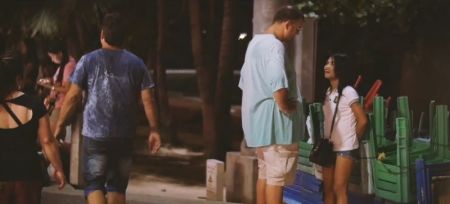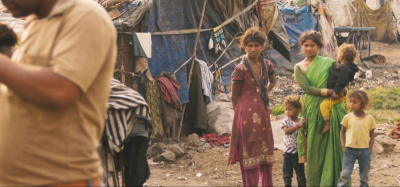Christians Urged to Take 'One Night Stand for Freedom,' Help Girls Deprived of Humanity in Sex Slavery

A Christian humanitarian organization is urging people to give up one night of entertainment in order to help women and girls around the world trapped in "unspeakable situations" in the sex industry.
World Help, founded in 1991 with a mission to bring physical and spiritual transformation to people, recently launched its "one-night stand for freedom" drive, calling on Christians to take a pledge to give up their Friday night's entertainment on May 19 and donate the money instead to help liberate girls forced to live as sex slaves.
Noel Yeatts, World Help's vice president, has seen and fought firsthand for the millions of men, women, and children around the world that find themselves in modern-day slavery in her over 20 years of international experience. She shared a number of powerful personal stories in an interview with The Christian Post on Thursday.
Yeatts offered her thoughts below on why it is so important for Christians to heed Jesus' call to stand up for the poor and defend the powerless, especially those robbed of their choices and deprived of their humanity.
CP: What inspired the idea behind Freedom Friday's "one-night stand for freedom?" What does the initiative mean?
Yeatts: This past February, I found myself in the heart of Thailand's red-light district. Considered the primary engine behind much of today's modern-day slavery, Thailand's sex industry is a multi-billion-dollar enterprise. Some cities are estimated to have nearly 50,000 sex workers — the streets are lined with women ready to be bought by the highest bidder — and millions of "sex tourists" flock to the country each year to exploit these young women.
It was here that I met Nan. At just 11 years old, she was taken from her rural Thai village and sold to a family in Bangkok to help take care of an elderly couple. But, as you can imagine at that young age, she was simply too small and too weak to lift an elderly adult in and out of bed. Frustrated with her abilities, the couple sold her to a bar in the city's red-light district. Barely a teenager, Nan found herself in an unspeakable situation. The sex industry deprived her of her choices, her freedom, and her humanity. She became an object, a toy to be tossed around for someone else's pleasure. And without someone's help, she had no chance of escape.
This Friday, May 19, we are challenging everyone who loves freedom to take a one-night stand for a girl like Nan. Instead of enjoying the usual Friday-night activities — going out for dinner or a movie — we are asking people to donate that night's monetary worth to help girls trapped in sexual slavery find freedom.

Go to FreedomFriday.com and sign the pledge to take a one-night stand for freedom and to give.
CP: What are some of the tragedies and the life that World Help is trying to save women and girls from?
Yeatts: Modern-day slavery — especially sex trafficking and sexual slavery — expresses itself in many ways; yet, at heart, the result is always the same: bondage and loss of freedom.
Every story ends with a young woman losing her power to choose: The parents who sell their daughter as a servant; the women who are branded like cattle to be purchased in red-light district dancing bars; the girl forced into a marriage not of her choosing; or the mother who enters into prostitution to provide for her son and ends up trapped in the sex industry. And every story also includes the common marks of abuse, vulnerability, neglect, and exploitation.
World Help is working to help women trapped in slavery find freedom — both physically and spiritually. Our rehabilitation homes help them find a future through educational and vocational opportunities, while also restoring their identity and self-worth by reminding them they are priceless and loved.
CP: Why is advocating for women worldwide and sex trafficking victims so important to you?
Yeatts: In one of my most recent opinion pieces for The Christian Post, I told the story of Kanya. When I first met Kanya, I was surprised to hear she was only a few years younger than I am and that we both have a son the same age. For a brief moment I could relate to her — we seemed to have so much in common. Yet our lives were worlds apart.
Two years ago, Kanya entered Thailand's sex industry to provide for her son. While I have many choices on how to take care of and provide for my own son, Kanya's only option is to go out every night to the city's dancing bars and sell her body to the highest bidder to make a living. Poverty has driven her to this dire situation — she has no other choice.
I believe every woman has the right to choose the kind of life she wants to live — to choose her own dreams, and live life on her own terms. Yet global statistics tell us that many women today live powerless and without the ability to choose. Conservative estimates report at least 21 million people are trapped in modern-day slavery — recent estimates put this figure at over 46 million. More than half of these are women and girls. As a woman, a mother, and a Christian, I'm fighting for the right of every woman to live without fear and to have the power to choose life, freedom, and hope.
CP: What is the Christian responsibility in helping sex trafficking victims?
Yeatts: One of the common threads running throughout the Bible is that God is a God of justice — He stands for the oppressed, fights for the cause of the poor, and defends the powerless. We find this same thread in Jesus' ministry. In what's believed to be one of His first public sermons, Jesus read the words from Isaiah, saying, "He has sent me to proclaim liberty to the captives and recovering of sight to the blind, to set at liberty those who are oppressed." This was the heart behind Jesus' mission on Earth. He liberated people spiritually — from brokenness, death, and sin — and physically — from illness, bondage, and physical death itself. As Christians, we share in this same ministry, and, as a follower of Jesus, I believe that fighting for those trapped in modern-day slavery is a powerful reflection of the Gospel. My humanity alone should compel me to act, but my faith requires it.
There are many great organizations doing incredible things to raise awareness, fight human trafficking, and create opportunities for men and women to find freedom. Our World Help team works with partners on the ground who are literally saving and changing people's lives every day. Yet, the truth of the matter is, the magnitude of modern-day slavery demands that all of us should be involved. Can you imagine what kind of impact the combined voices of millions of Christians could have if we all came together to solve this issue? We could end modern-day slavery in our generation.
CP: What are the main factors and causes that drive sex trafficking worldwide? Why is it so hard to put a stop to this practice?
Yeatts: Modern-day slavery is a complex issue, often caused and driven by a blend of interconnected factors. Besides the underlying effect of supply and demand for sex — the State Department estimates that human trafficking is an industry worth $150 billion — factors ranging from famine and homelessness to natural disasters and climate change, forced displacement and war, and even ancestral traditions play a role in promoting human trafficking and slavery. Perhaps a better term for this is cultural slavery; an example of this is in India's Banchara community.
For more than 500 years, girls in India's Banchara community have been expected to support their families economically and sometimes even pay for their brothers' dowries. Their own mothers groom these girls at the age of 12 to enter into the sex industry. For several years now, World Help has been working to help girls from this community by providing a clean-water well and building a church and a rehabilitation home. If these girls can have a choice for a different life, they can find freedom.
Putting a stop to human trafficking is hard because it's such a complicated issue, as you can see from the example above. Yet, what I have discovered as I've worked in communities where women are trapped in the sex industry and talked with victims of human trafficking, is that at the heart of almost all modern-day slavery is the issue of poverty. I've said this before, but it's worth saying again: the greatest injustice of poverty is that it robs people of their choices. When vulnerable people, especially women, lose the power to choose, they lose their freedom.
CP: What is World Help doing to fight modern-day slavery, and how can people join and help?
Yeatts: Remember Nan? She finally found her way to one of our safe houses in Bangkok. There, she was welcomed into a family environment and received support and care. She now has dreams for her future and is studying to become an engineer.
At World Help we work to provide help for today and hope for tomorrow. Our safe houses in India and Thailand, clean-water projects, and child sponsorship program all work together to rescue women and children affected by modern-day slavery and help prevent others from ever entering it.
What I have seen is that when we help just one girl, when we set just one girl free, we can end this vicious cycle for generations to come. That means her daughter will not go into this work, and her daughter, and her daughter, and so on. Perhaps the most important thing those interested in ending modern-day slavery need to know is that, in the fight for freedom, prevention is just as important as intervention. We have to concentrate our efforts just as much in liberating those who are captive today, as in preventing those who are vulnerable to exploitation from ever entering into slavery. This is why we are inviting everyone to join us for Freedom Friday May 19, and to learn how he or she can be involved through our programs in fighting for freedom.
Watch the "one-night stand for freedom" video below:





















